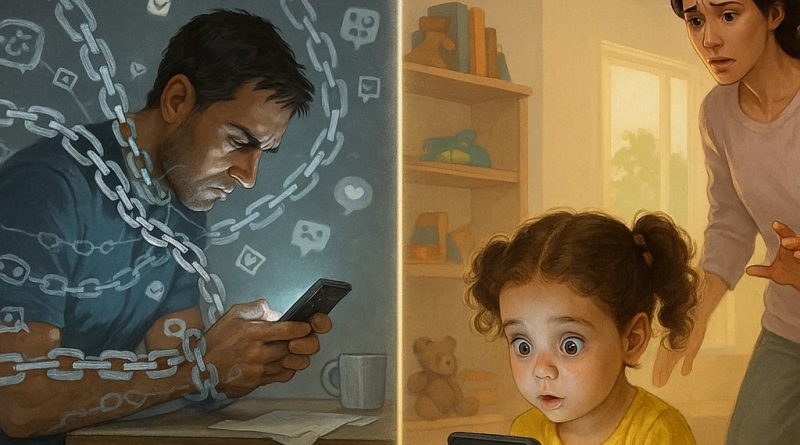Are We Really in Control of Our Smartphones? Understanding the Impact on Mind and Children
Smartphones have become an inseparable part of our lives, shaping how we communicate, work, and entertain ourselves. But are we truly in control of these devices, or are they controlling us? This question is more relevant than ever as we delve into the psychological impacts of smartphone usage on adults and the concerning effects on children when parents, particularly mothers, hand over phones to young kids. In this article, we’ll explore the hidden consequences of smartphone dependency and offer insights into fostering a healthier relationship with technology.
The Illusion of Control: Smartphones and the Adult Mind
At first glance, smartphones seem like tools of empowerment. They connect us to the world, provide instant information, and streamline daily tasks. However, beneath this convenience lies a subtle manipulation. App developers and tech companies design interfaces to hook users through dopamine-driven feedback loops. Every notification, like, or message triggers a small rush of pleasure, making us crave more. Studies suggest that the average person checks their phone over 150 times a day, often without conscious intent. This compulsive behavior can lead to reduced attention spans, heightened anxiety, and even symptoms akin to addiction.
The impact on mental health is profound. Excessive screen time has been linked to stress, sleep disturbances, and feelings of isolation, despite the illusion of constant connectivity. When we prioritize virtual interactions over real-life relationships, we risk diminishing our emotional well-being. The question remains: are we using our smartphones, or are they using us to keep us engaged for profit-driven algorithms?
The Vulnerable Minds of Children: When Mothers Hand Over Phones
For children, the stakes are even higher. In an effort to pacify tantrums or keep kids occupied, many mothers resort to giving smartphones or tablets to their young ones. While this may seem like a harmless quick fix, the long-term consequences can be detrimental. Children’s brains are in critical stages of development, and early exposure to screens can interfere with cognitive and emotional growth.
One major concern is the impact on attention and learning. Unlike traditional play, which fosters creativity and problem-solving, passive consumption of digital content can hinder a child’s ability to focus. Research indicates that excessive screen time in early childhood is associated with delays in language and social skills development. Furthermore, the overstimulation from fast-paced videos and games can make it harder for children to engage in slower, more meaningful activities like reading or imaginative play.
Beyond cognitive effects, there are emotional and behavioral risks. Children exposed to smartphones at a young age may struggle with self-regulation, as they become accustomed to instant gratification from games and apps. This can manifest as irritability or frustration when the device is taken away. Additionally, inappropriate content or cyberbullying, even on seemingly child-friendly platforms, poses a threat to their mental health and sense of security.
Societal and Familial Dynamics: A Mother’s Dilemma
Mothers often face immense pressure to balance parenting with other responsibilities, and smartphones can appear as a convenient distraction tool. However, this practice can unintentionally strain parent-child bonding. When a child is engrossed in a screen, opportunities for meaningful interaction—such as storytelling, outdoor play, or simple conversations—are lost. Over time, this can weaken the emotional connection between mother and child, replacing genuine engagement with digital pacification.
Society also plays a role in normalizing this trend. With technology marketed as an educational tool, many parents feel compelled to introduce devices early, fearing their child might fall behind. Yet, the American Academy of Pediatrics recommends limiting screen time to one hour per day for children aged 2 to 5, emphasizing the importance of real-world experiences over virtual ones.
Breaking the Cycle: Reclaiming Control Over Smartphones
To regain control over our smartphones and protect our children’s well-being, intentional steps are necessary. For adults, setting boundaries is key. This can include designating phone-free zones, such as during meals or before bedtime, and using apps to track and limit screen time. Mindfulness practices can also help us become more aware of our digital habits, allowing us to prioritize real-life connections over virtual ones.
For mothers and parents, alternatives to screen time can make a significant difference. Engaging children in hands-on activities like drawing, building, or exploring nature not only stimulates their creativity but also strengthens family bonds. Establishing clear rules about device usage from an early age helps set expectations and prevents dependency. When technology is introduced, it should be age-appropriate and supervised, ensuring that it complements rather than replaces human interaction.
A Call for Digital Balance
Smartphones are powerful tools, but their influence over our minds and the vulnerable psyches of children cannot be ignored. While we may believe we control these devices, their design often exploits our psychological tendencies, leading to overuse and unintended consequences. For children, early exposure—often initiated by well-meaning mothers seeking a moment of peace—can disrupt critical developmental stages, affecting their ability to learn, connect, and regulate emotions.
By fostering awareness and adopting healthier tech habits, we can reclaim control and safeguard our mental health and that of future generations. Let’s strive for a balanced relationship with technology, where smartphones serve as tools for growth rather than masters of our attention. Are you ready to take the first step toward digital wellness? Start by reflecting on your own smartphone habits and prioritizing meaningful moments with your loved ones today.

